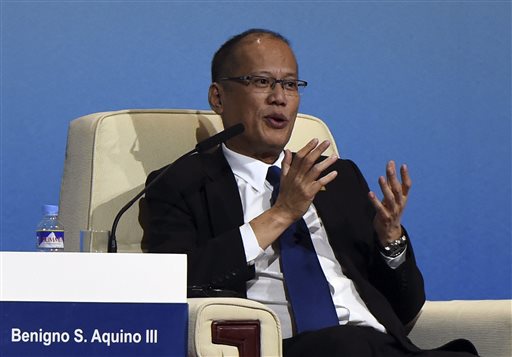Aquino discusses sea dispute in bilateral talks with APEC heads of state

President Aquino speaks as he takes part in a summit dialogue at the Apec CEO Summit at the China National Convention Center in Beijing, China Sunday, Nov. 9, 2014, as part of the Asia-Pacific Economic Cooperation summit. AP PHOTO/WANG ZHAO, POOL
BEIJING — Although the territorial dispute between the Philippines and China in the West Philippine Sea was not on the agenda of the Asia-Pacific Economic Cooperation (APEC) summit here, President Aquino was unable to stay away from it in talks with other regional leaders, according to Foreign Affairs Secretary Albert del Rosario.
The President met on Sunday and Monday with Vietnamese President Truong Tan Sang, Thai Prime Minister Prayuth Chan-ocha, New Zealand Prime Minister John Philip Key, Papua New Guinea Prime Minister Peter Paire O’Neill and Canadian Prime Minister Stephen Joseph Harper for bilateral talks, Del Rosario told reporters.
Del Rosario, traveling with Mr. Aquino for the summit, said the President and his counterparts discussed many issues of common interest and concern during separate calls at the Philippine Embassy here.
But a common discussion in all the meetings had to do with the territorial dispute between the Philippines and China in the West Philippine Sea, which Manila has taken to the United Nations for arbitration.
“There was a broad discussion on the South China Sea [dispute],” Del Rosario said.
He said that in Mr. Aquino’s meeting with the Vietnamese president, the two leaders agreed to pursue a settlement of their countries’ territorial dispute with China, in accordance with the United Nations Convention on the Law of the Sea.
This was also the discussion with the Canadian prime minister, where, Del Rosario said, he and the President discussed “the application of international law in resolving regional disputes.”
Asked whether the discussion on the dispute was just informative, Del Rosario said it was just “broad strokes.”
The sparring over who owns what in the South China Sea may be expected to break out at the Association of Southeast Asian Nations (Asean) summit in Burma (Myanmar) this week.
Rival claims have gnawed away at ties between Asean members Vietnam and the Philippines and China, which claims all of the 3.5-million-square-kilometer South China Sea, including waters near its smaller neighbors’ shores.
The issue has also become a key testing ground for diplomacy between China and the United States, which has cozied up to the 10-member Asean as part of a wider eastward foreign policy “pivot.”
Leaders including US President Barack Obama, Chinese Premier Li Keqiang and Indian Prime Minister Narendra Modi will gather in Naypyidaw, Burma, for the two-day Asean summit from Wednesday. The meeting also takes in an expanded list of dignitaries for the East Asia Summit.
Beijing has been accused of aggression after boosting naval patrols in waters contested with the Philippines and positioning an oil rig in seas disputed with Vietnam in May, sparking deadly anti-China riots in Vietnam.
It has given ground on low-level talks with Asean toward a multilateral, binding code of conduct to governing the seas.
But analysts and diplomats are skeptical of a tangible deal, as China prefers bilateral talks with its smaller neighbors, allowing it to exert its massive economic and political leverage in a region dependent on Chinese trade.
That leaves expectations low for any movement on the seemingly intractable South China Sea squabble, which ritually dominates regional forums.
The disputed waters are crisscrossed by vital shipping lanes, which are also believed to be sitting atop vast oil and mineral deposits.
Parts of the sea are also claimed by Brunei, Malaysia and Taiwan.
Relations between the Philippines and China have been cold since Manila brought an arbitration case against Beijing to a UN arbitration tribunal last year.
But Del Rosario made it clear that China was a “friend and neighbor” of the Philippines, and that it was working to have a “constructive relationship” with Beijing that would be mutually beneficial.
He reiterated President Aquino’s position that while Manila has a maritime dispute with Beijing, this is “not the sum total of our relations.”
Del Rosario recalled that President Aquino and former Chinese President Hu Jintao agreed in 2011 that they would work together on moving forward the major bilateral relations between the two countries while working separately on contentious issues that included their maritime dispute.
“And so we have been working to have this agreement honored because we are, of course, very interested in being able to again have a close relationship with China, whom we consider a valuable friend,” he said.
Del Rosario said Manila filed the arbitration case against Beijing after exerting “every possible reasonable means to arrive at a peaceful settlement.”
He said it was the “last resort,” adding that the ruling would clarify maritime entitlements for all nations involved in the dispute.
Arbitration, as defined by the United Nations, is “not an unfriendly act,” Del Rosario said.
“It is, as a matter of fact, one that we are [using] to be able to preserve a valuable friendship,” he said.
President Aquino met with Chinese President Xi Jinping Monday night, as the host was to individually welcome 20 Apec leaders to a two-hourlong welcome dinner to be held at the Water Cube here. With a report from AFP
For comprehensive coverage, in-depth analysis, visit our special page for West Philippine Sea updates. Stay informed with articles, videos, and expert opinions.